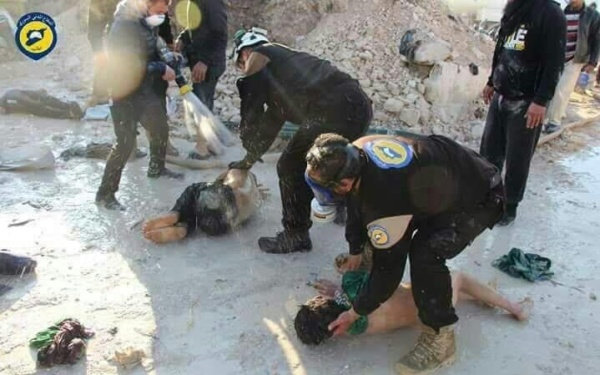White Helmets rescuers treat victims of the Assad regime’s sarin attack on Khan Sheikhoun in northwest Syria, April 4, 2017
Syria’s Assad regime has likely or definitely used chemical weapons in 17 cases, the head of international chemical weapons inspectors has reported to the UN Security Council.
Fernando Arias, the Secretary General of the Organization for the Prohibition of Chemical Weapons, said 77 allegations have been investigated.
Arias noted the “disturbing reality” that questions remain about the failure of the regime to fully declare its chemical weapons, facilities, and precursors. He said the OPCW will be pursuing “the presence of a new chemical weapons agent found in samples collected in large storage containers in September 2020″.
The Secretary General informed the regime that he intended to send a team to Syria from May 18 to June 1, but never had a response to his request for visas. A further message for a May 28 start date was also ignored, and Arias “decided to postpone the mission until further notice”.
The Regime’s Responsibility
In April, OPCW member states suspended the Assad regime’s rights and privileges, after the finding that Damascus was continuing to withhold information and allow investigations.
The suspension came soon after OPCW inspectors formally found there were “reasonable grounds” to attribute responsibility to the regime for a February 2018 chlorine attack on Saraqib in Idlib Province in northwest Syria.
The OPCW has also attributed responsibility to the regime for the April 2017 sarin attack on Khan Sheikhoun in Idlib Province, which killed about 90 people and wounded hundreds, and for use of sarin and chlorine on Latamineh, in neighboring Hama Province, in late March 2017.
UN and OPCW investigations have assessed more than 30 attacks by the regime. The Global Public Policy Institute’s comprehensive review has analyzed 349 incidents.
Russia and supportive activists have pursued years of propaganda and disinformation to undermine the OPCW.
Russian Ambassador Vassily Nebenzia continued the effort after Arias’s statement, accusing the OPCW of using information “from biased sources opposed to the Syrian government”, collecting evidence remotely, and relying on “pseudo witnesses”.

